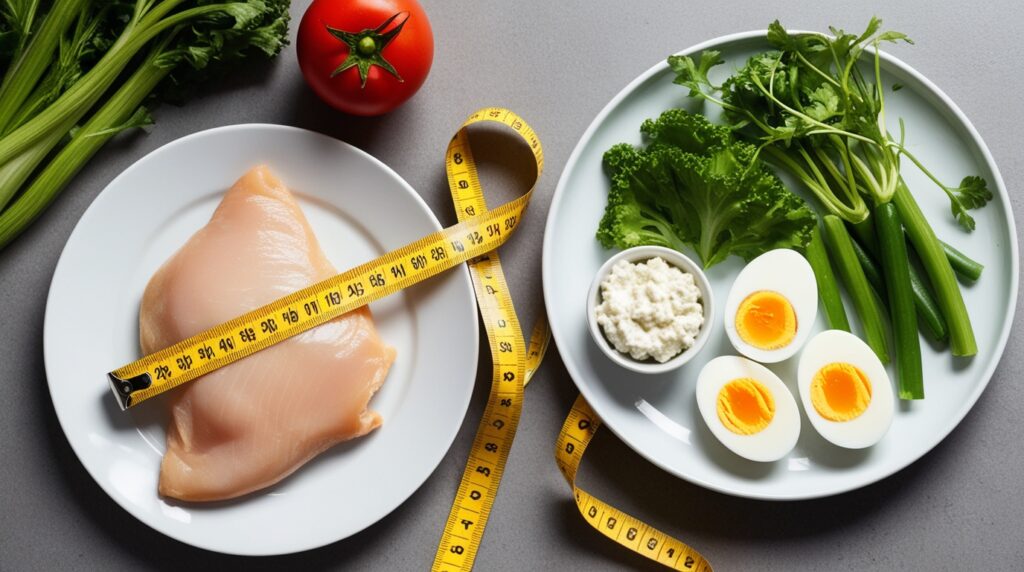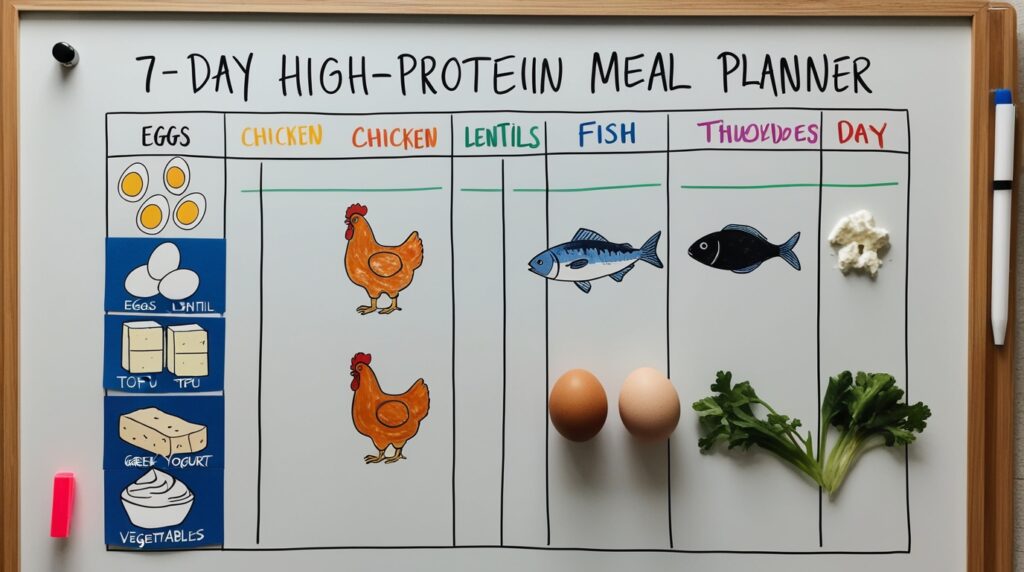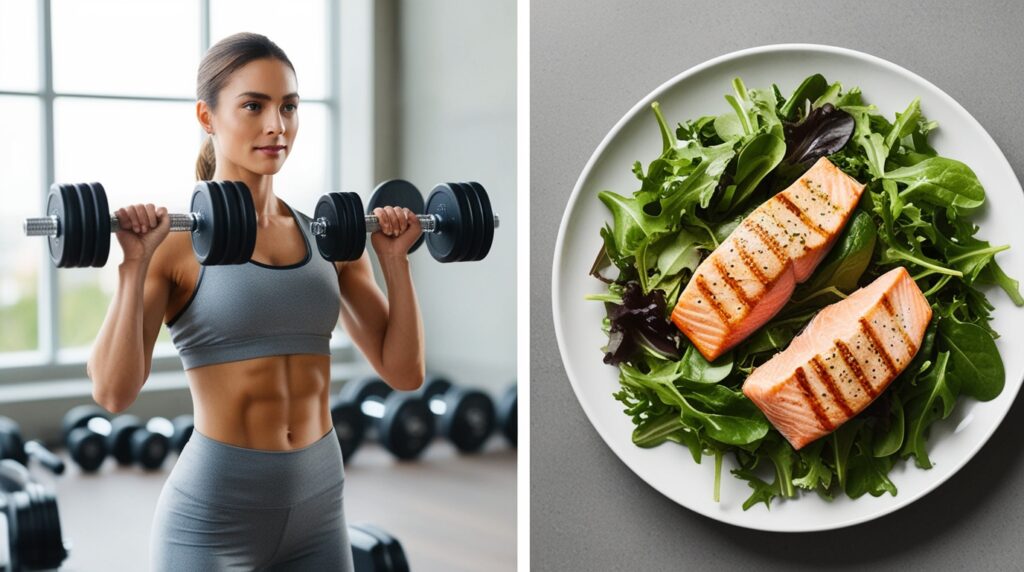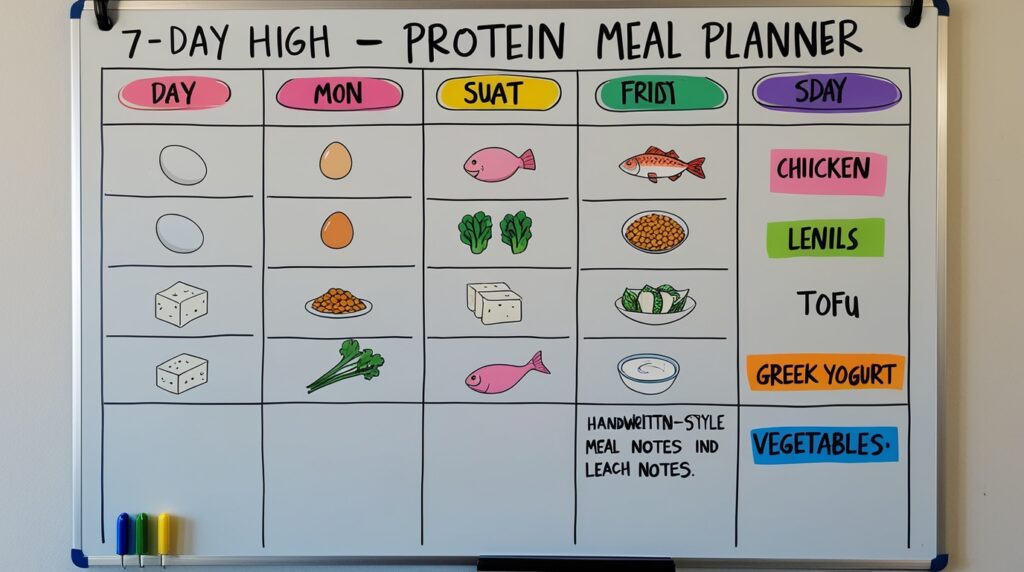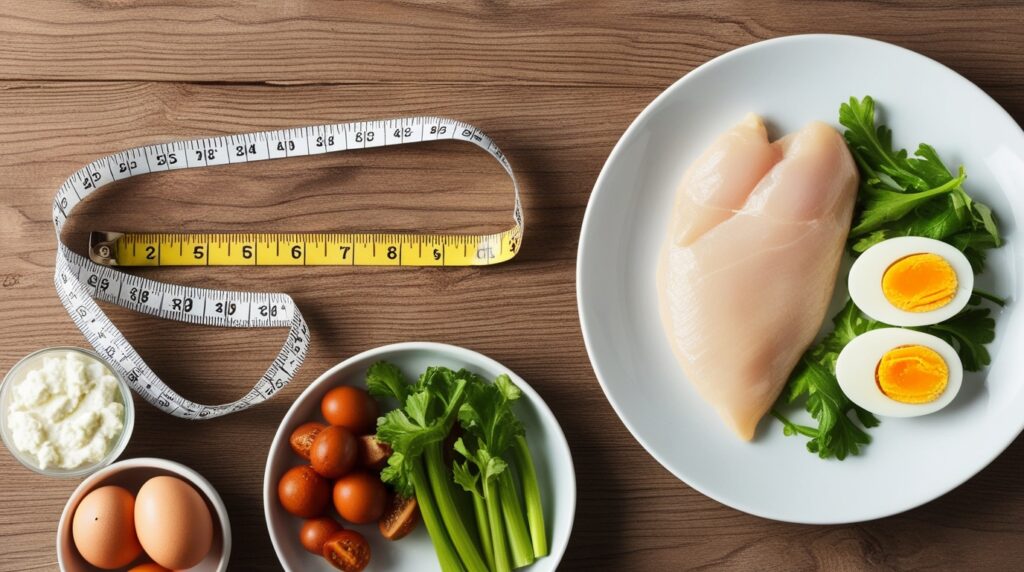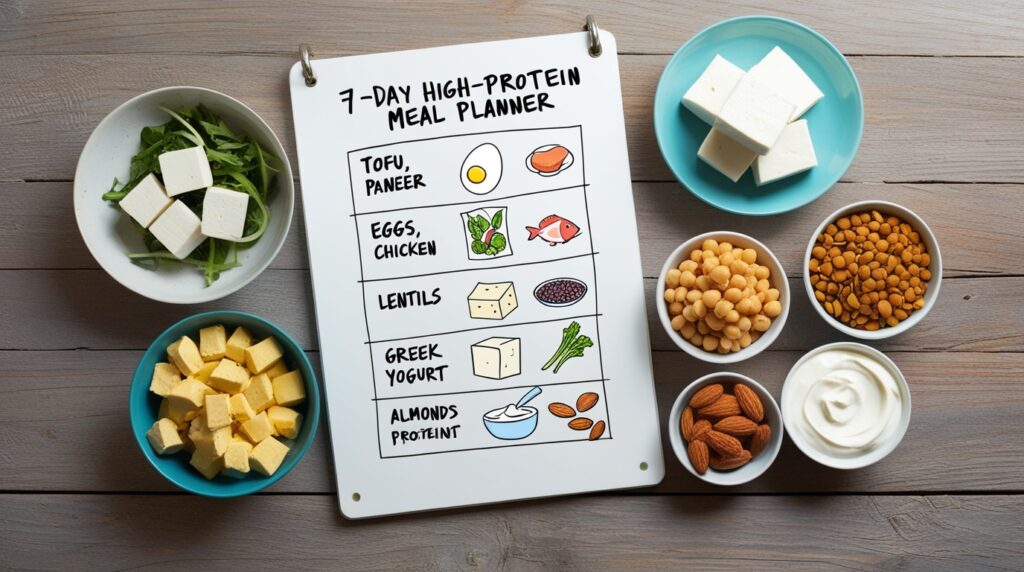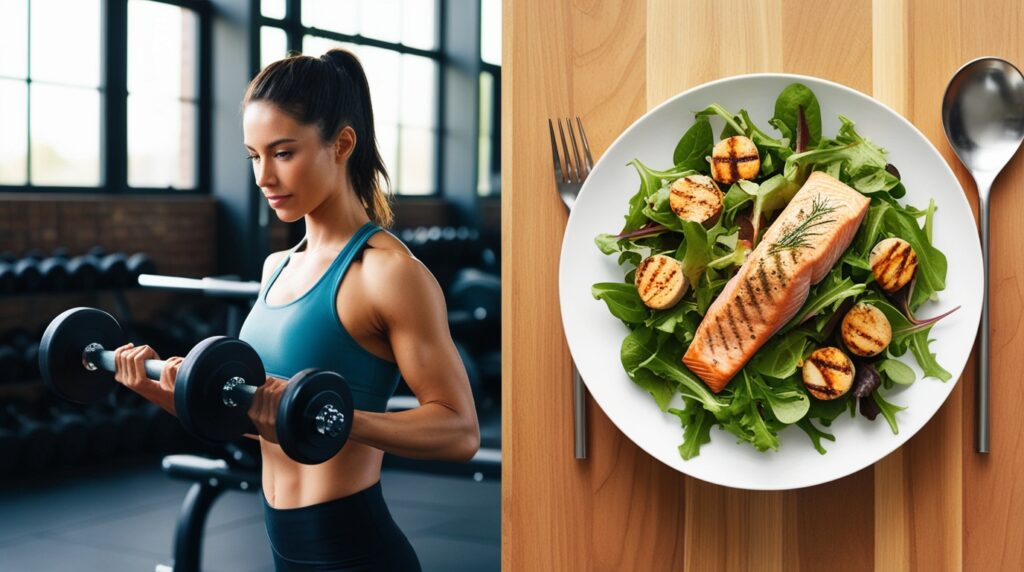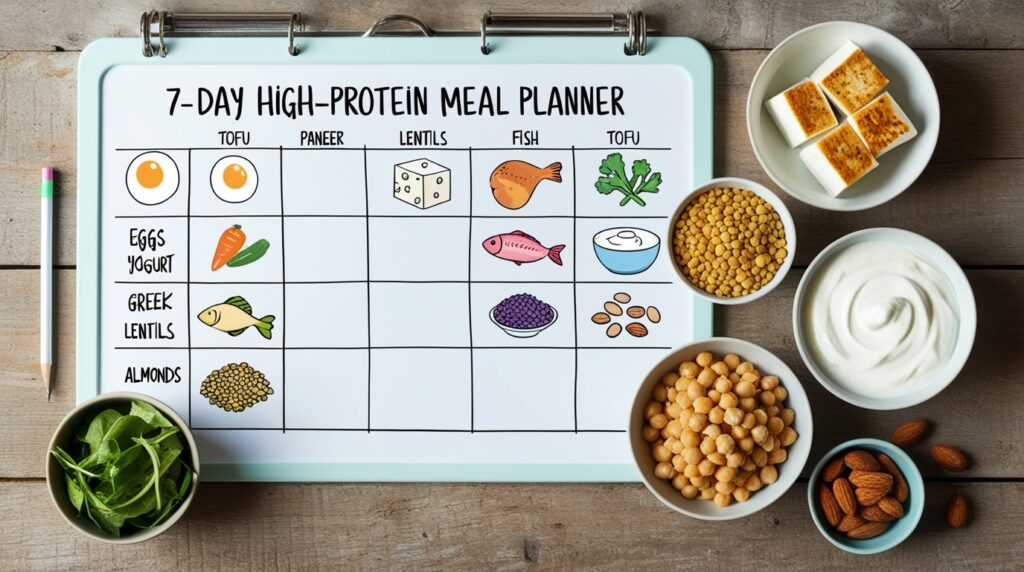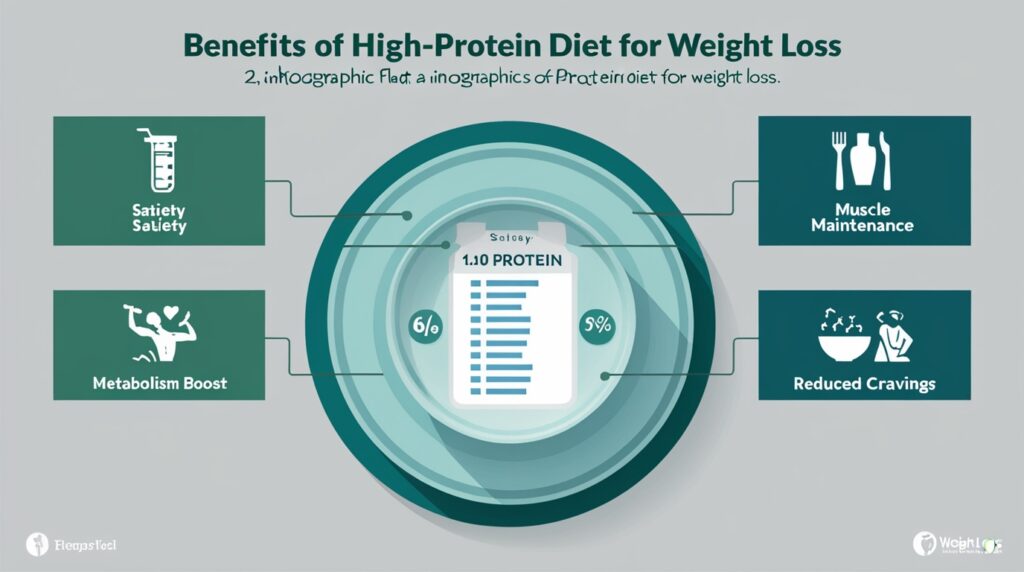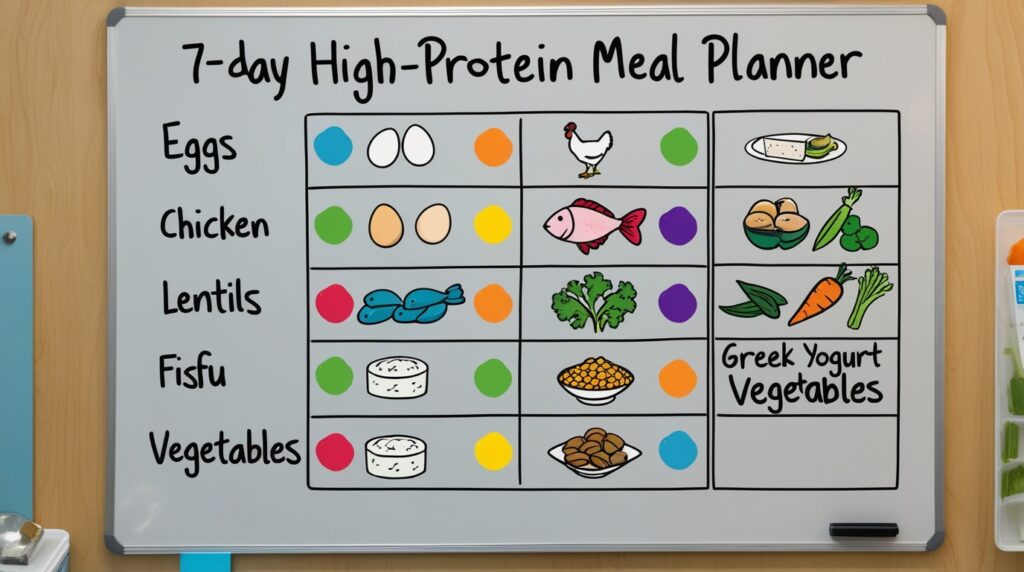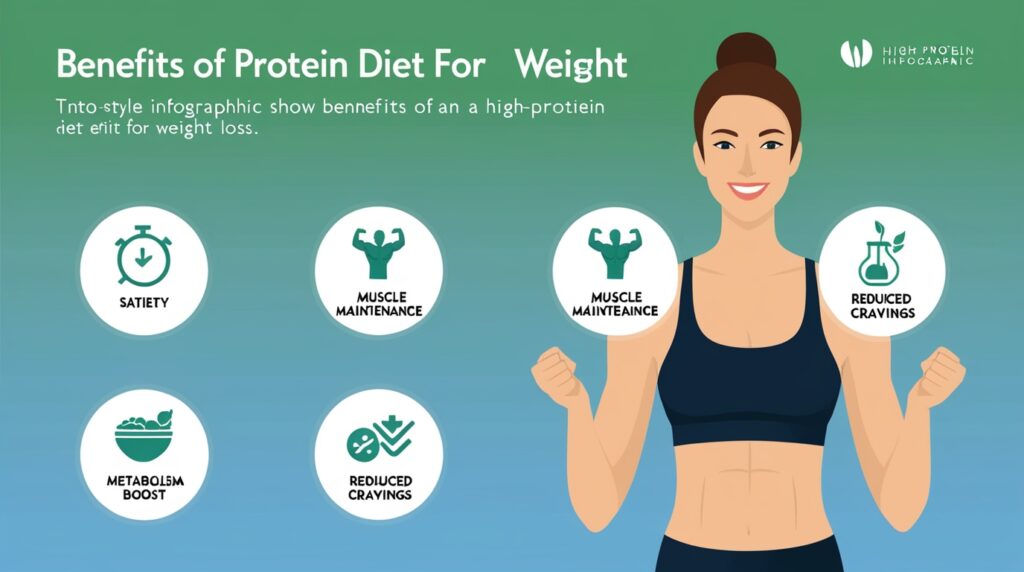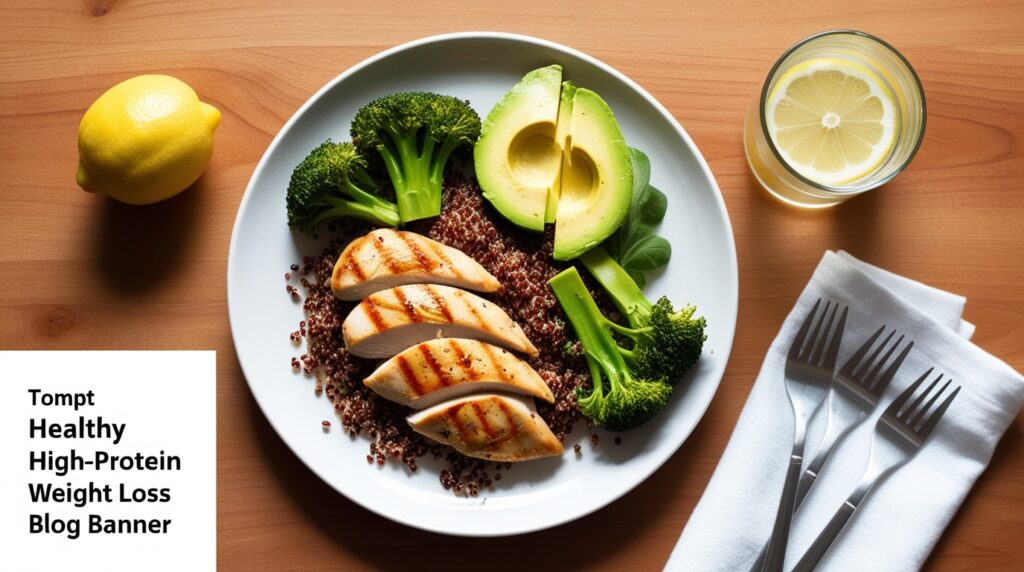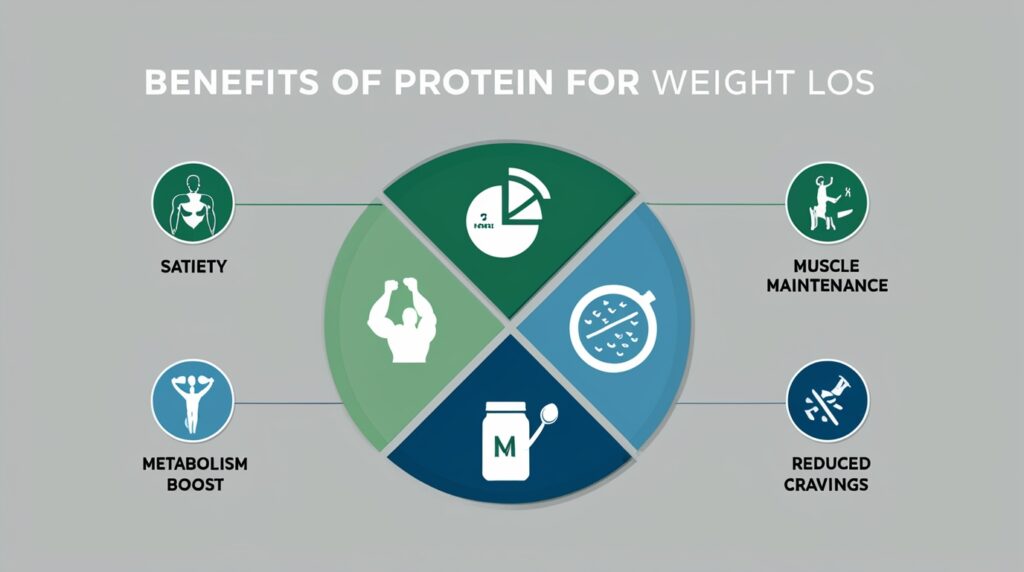Protein is often hailed as the king of weight loss nutrients — and for good reason. A diet high in protein can help curb appetite, increase muscle mass, boost metabolism, and reduce cravings, making it one of the most effective strategies for weight loss. If you’re ready to transform your eating habits, this 7-Day Protein Diet Plan for Weight Loss will help you shed fat, stay full longer, and fuel your body the right way.
Table of Contents
This plan is different from general 7-day diet plans that include balanced carbs, fats, and proteins. Instead, this is a protein-focused approach that prioritizes lean meats, legumes, dairy, and plant-based protein sources for faster results without compromising on nutrition.
7-Day Protein Diet Plan for Weight Loss
Why 7-Day Protein Diet Plan for Weight Loss Works
Before diving into the actual meal plan, let’s understand why protein should be your go-to macronutrient when aiming to lose weight:
1. Increased Satiety
Protein is more filling than carbohydrates or fats. A high-protein meal helps you feel full for longer, reducing the chances of overeating.
2. Boosts Metabolism
Digesting protein requires more energy than digesting fats or carbs. This thermogenic effect helps your body burn more calories throughout the day.
3. Preserves Lean Muscle Mass
When losing weight, there’s always a risk of losing muscle along with fat. A protein-rich diet helps protect and preserve muscle mass.
4. Reduces Cravings
High-protein diets reduce levels of the hunger hormone ghrelin and increase peptide YY, a hormone that makes you feel full.
How This 7-Day Protein Diet Plan for Weight Loss Is Structured
- Targeted protein intake: 25–35% of daily calories from protein
- Low to moderate carbs: Focused on vegetables, legumes, and low-GI carbs
- Healthy fats: Nuts, seeds, olive oil, and avocado
- No added sugars or processed carbs
- Hydration and light physical activity encouraged
Each day includes:
- 3 main meals
- 1–2 protein-based snacks
Now, let’s get started with the daily meal plans.
Day 1: Kickstarting With Lean Protein
Breakfast
- 3 boiled eggs
- 1 slice of whole grain toast
- ½ avocado
- Black coffee or green tea
Snack
- Greek yogurt (unsweetened, 100g)
- Handful of almonds
Lunch
- Grilled chicken breast (150g)
- Quinoa salad with chickpeas, cucumbers, tomatoes, and olive oil
- Steamed broccoli
Snack
- Cottage cheese (100g)
- Sliced cucumber
Dinner
- Baked salmon (150g)
- Sauteed spinach with garlic
- Small serving of sweet potato (optional)
Day 2: Plant-Powered Protein
Breakfast
- Tofu scramble with bell peppers, onions, and spinach
- 1 slice of sprouted grain bread
- Herbal tea
Snack
- Roasted chickpeas
- A few walnuts
Lunch
- Lentil soup
- Mixed green salad with tofu cubes and vinaigrette dressing
- 1 small apple
Snack
- Protein smoothie (plant-based protein powder, almond milk, berries)
Dinner
- Grilled tempeh
- Stir-fried green beans, carrots, and mushrooms
- Brown rice (½ cup)
Day 3: Focus on Dairy and Eggs
Breakfast
- Omelette with 3 eggs, tomatoes, and feta cheese
- 1 whole wheat toast
Snack
- Skim milk (200ml)
- A few cashews
Lunch
- Cottage cheese salad with tomatoes, cucumber, and olives
- 1 pear
Snack
- Boiled egg
- 1 teaspoon peanut butter on celery sticks
Dinner
- Grilled paneer (150g)
- Roasted vegetables (zucchini, eggplant, bell peppers)
- A small quinoa portion
Day 4: Seafood and Legume Combo
Breakfast
- Smoked salmon on multigrain toast
- Sliced avocado
- Green tea
Snack
- Edamame (steamed, salted lightly)
- Handful of pistachios
Lunch
- Tuna salad with olive oil, greens, cherry tomatoes, and hard-boiled egg
- 1 orange
Snack
- Protein bar (minimum 15g protein, low sugar)
Dinner
- Shrimp stir-fry with garlic, ginger, and mixed veggies
- Cauliflower rice
Day 5: Egg-Centric Meals
Breakfast
- Scrambled eggs with spinach and onions
- 1 small banana
Snack
- 1 hard-boiled egg
- Green smoothie (spinach, mint, protein powder)
Lunch
- Egg salad wrap in lettuce leaves
- Mixed bean soup
- 1 kiwi
Snack
- Low-fat cheese slices
- Carrot sticks
Dinner
- Baked chicken thighs (skinless)
- Roasted Brussels sprouts
- Quinoa (½ cup)
Day 6: Vegetarian Protein Boost
Breakfast
- Moong dal chilla (2) with mint chutney
- Herbal tea
Snack
- Greek yogurt with sunflower seeds
Lunch
- Rajma curry (kidney beans)
- Brown rice (½ cup)
- Cucumber and tomato salad
Snack
- Protein shake (pea protein + almond milk + flaxseeds)
Dinner
- Soya chunks curry
- Steamed mixed veggies
- Small roti made with chickpea flour
Day 7: Balanced Closure
Breakfast
- Protein pancakes (oats, egg whites, banana, protein powder)
- Drizzle of honey (optional)
Snack
- Cottage cheese with chopped apple and cinnamon
Lunch
- Grilled fish (e.g., basa or tilapia)
- Sweet corn and avocado salad
Snack
- Boiled egg and a handful of almonds
Dinner
- Lentil stew with vegetables
- Small portion of brown rice or quinoa
- Steamed broccoli
Hydration and Supplementation Tips
To complement this high-protein diet:
- Drink 2.5–3 liters of water daily
- Include green tea or herbal tea for antioxidant benefits
- Optional supplements:
- Whey or plant-based protein powder
- Multivitamins if you’re on a restrictive version of this plan
- Omega-3s from fish oil capsules or flaxseed oil
Workout and Activity Suggestions
Pair this diet with moderate exercise for best results:
- Strength training: 3–4 times/week to preserve lean muscle
- Cardio: Walking, cycling, or swimming for fat burn
- Yoga or stretching: To aid recovery and digestion
Common Mistakes to Avoid on a High-Protein Diet
1. Ignoring Fiber
Protein-rich diets may lack fiber, so include vegetables, legumes, and seeds.
2. Skipping Meals
Even on a calorie deficit, skipping meals can lead to cravings and overeating later.
3. Not Balancing Fats and Carbs
Healthy fats and complex carbs are essential for sustained energy.
4. Not Drinking Enough Water
Protein metabolism produces nitrogen waste; hydration helps kidney function.
Who Should Avoid High-Protein Diets?
While generally safe, consult your doctor before starting this plan if you:
- Have kidney or liver issues
- Are pregnant or breastfeeding
- Take medications for diabetes or blood pressure
- Have gout or other metabolic disorders
Sample Grocery List for the Week
- Eggs
- Chicken breast
- Salmon/shrimp/fish
- Greek yogurt
- Paneer/tofu/tempeh
- Lentils, rajma, moong
- Soya chunks
Vegetables
- Spinach
- Broccoli
- Carrots
- Bell peppers
- Zucchini
- Cauliflower
Fruits
- Apple, banana, pear, kiwi
- Berries
- Avocado
Grains
- Quinoa
- Brown rice
- Whole grain/multigrain bread
Nuts & Seeds
- Almonds, walnuts, pistachios
- Sunflower, chia, flaxseeds
Others
- Olive oil
- Herbal teas
- Plant-based protein powder
- Cottage cheese
- Milk (dairy or unsweetened plant-based)
FAQs
Can I follow this protein diet for more than 7 days?
Yes, but it’s advisable to rotate protein sources and consult a nutritionist if continuing for more than 3 weeks.
Will I lose weight quickly on this plan?
Most people lose 1–3 kg in 7 days depending on starting weight, water retention, and activity level.
Can vegetarians follow this plan?
Absolutely. Plant-based proteins like lentils, chickpeas, soya, paneer, and tofu are excellent alternatives.
What happens after the 7 days are over?
You can transition to a more balanced plan or repeat this cycle with added variety to prevent nutritional gaps.
Final Thoughts: Is the 7-Day Protein Diet Plan for Weight Loss is Right for You?
If you’ve hit a plateau in your weight loss journey or struggle with constant hunger and low energy, a protein-focused 7-day meal plan may be the reset your body needs. This diet is not only effective but also sustainable when modified properly for long-term use. But before practicing, it is advisable to consult your dietitian.
Unlike generic diet plans, this approach supports fat loss, muscle maintenance, and metabolic health without excessive restrictions. After 7 days, you’ll feel lighter, stronger, and more in control of your eating habits.
Remember, consistency matters more than perfection. Let this plan be your guide.

